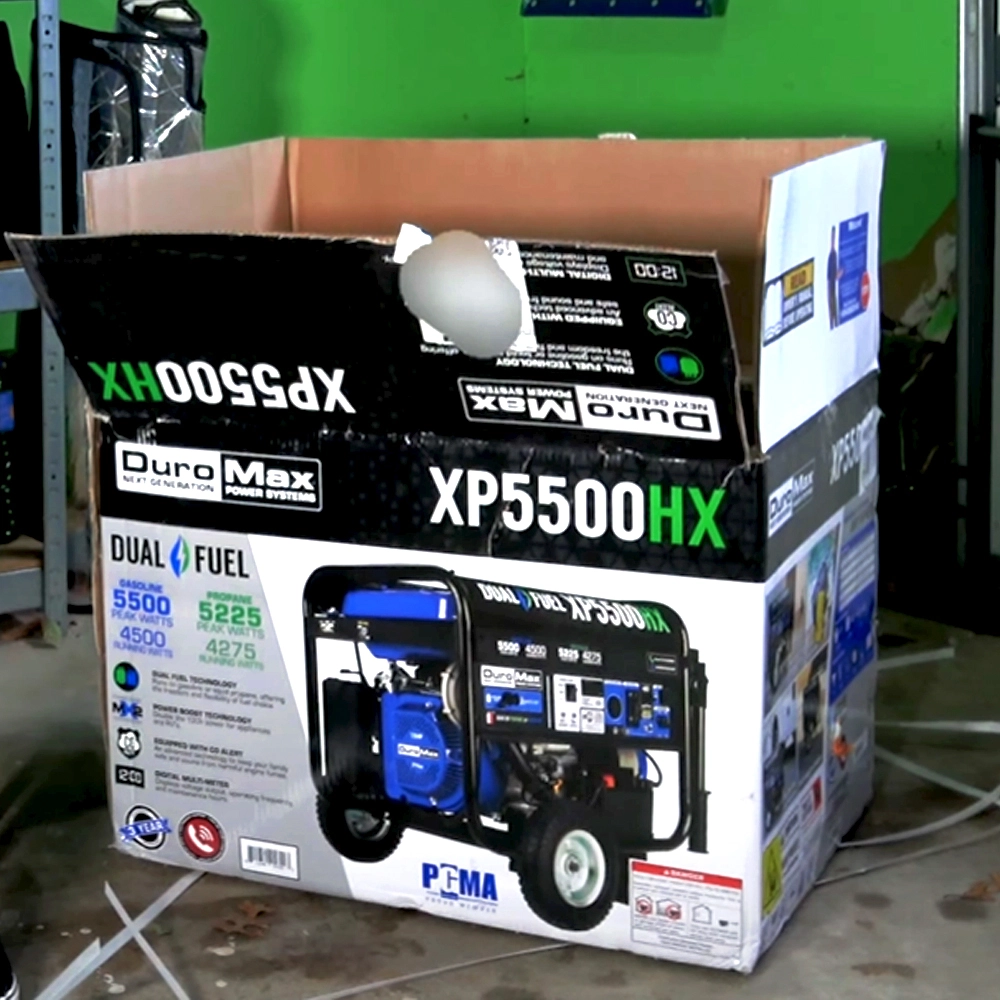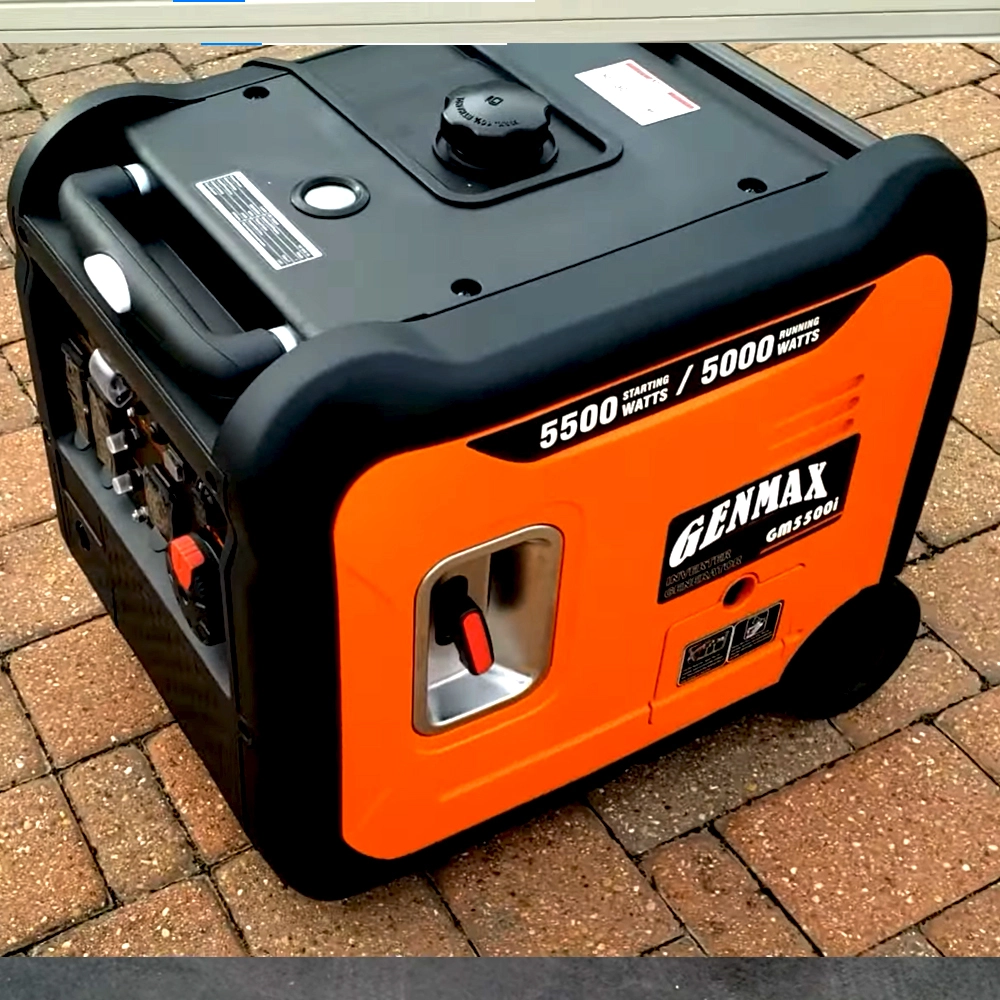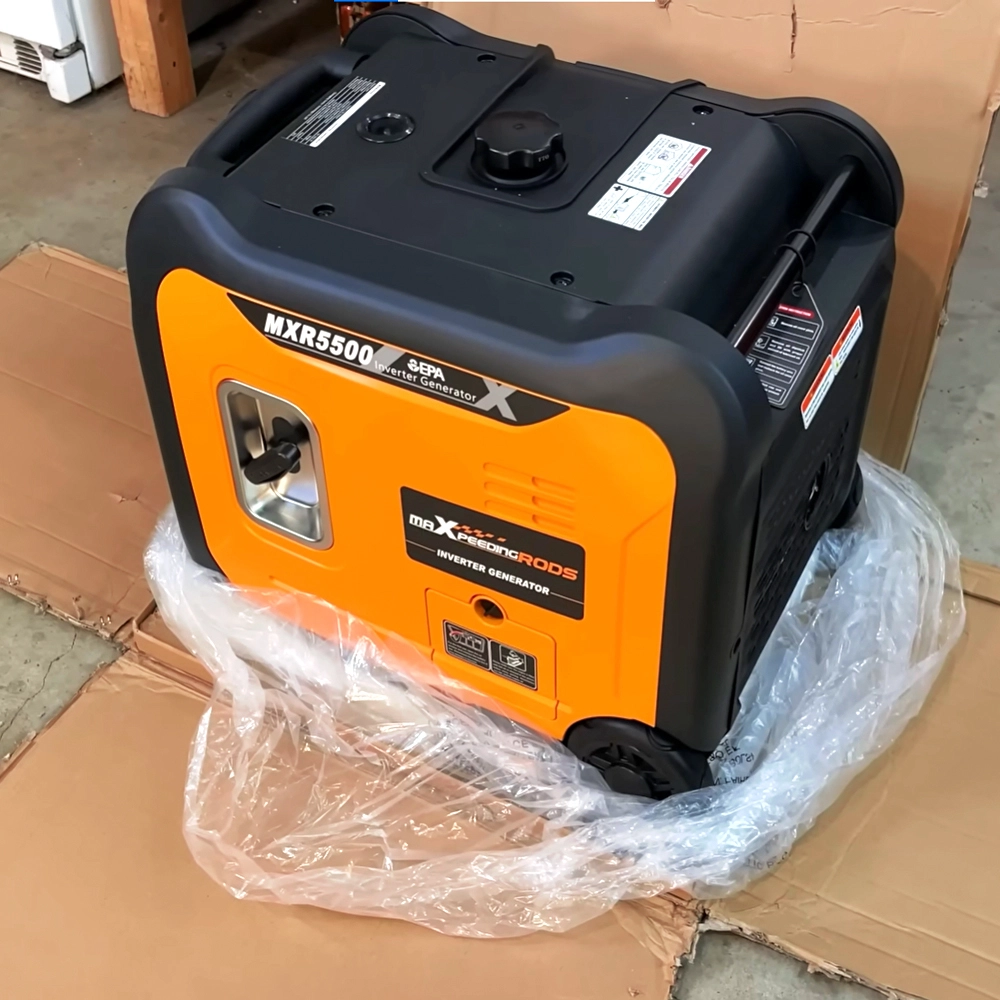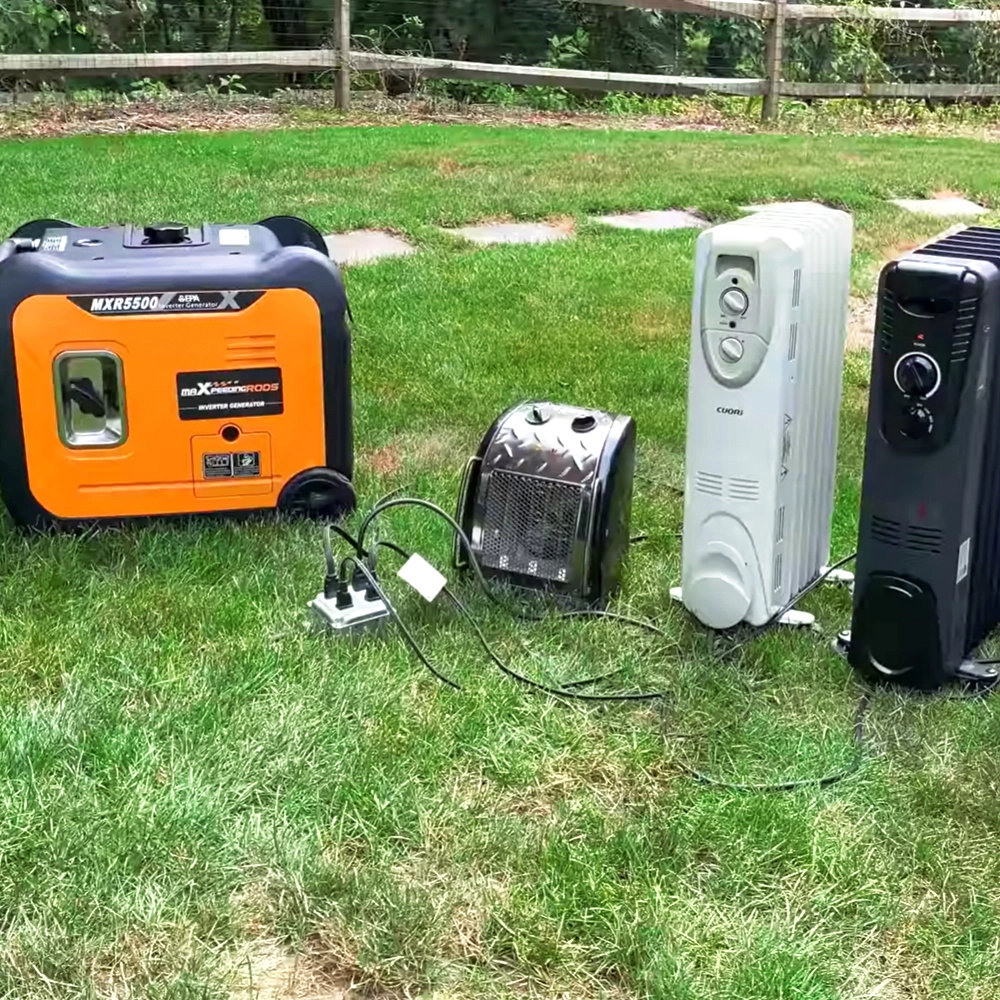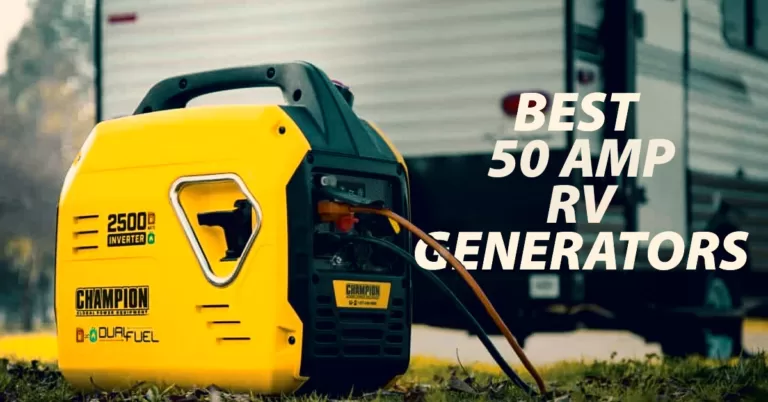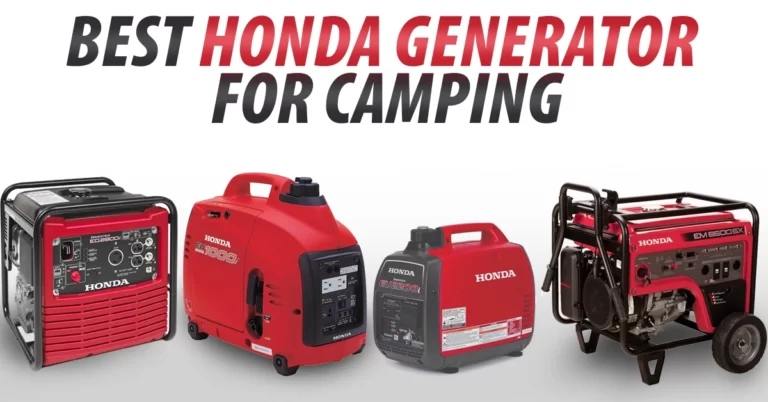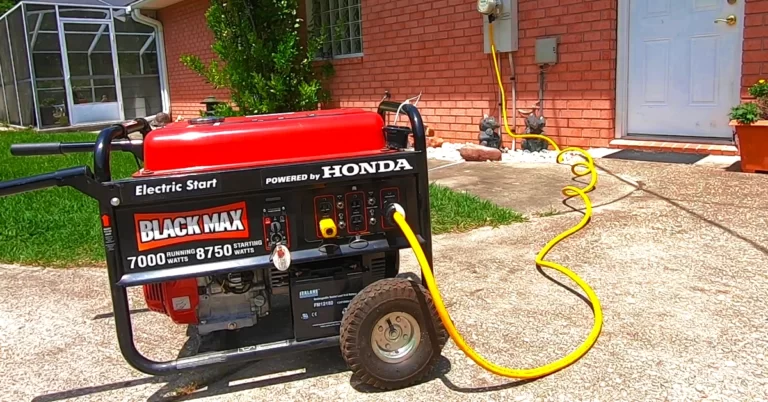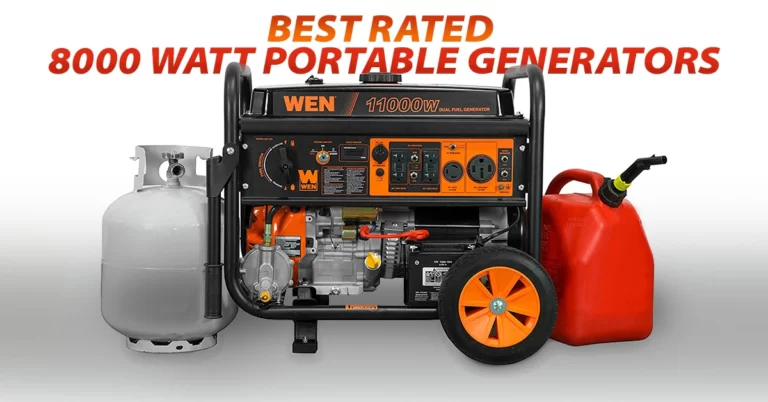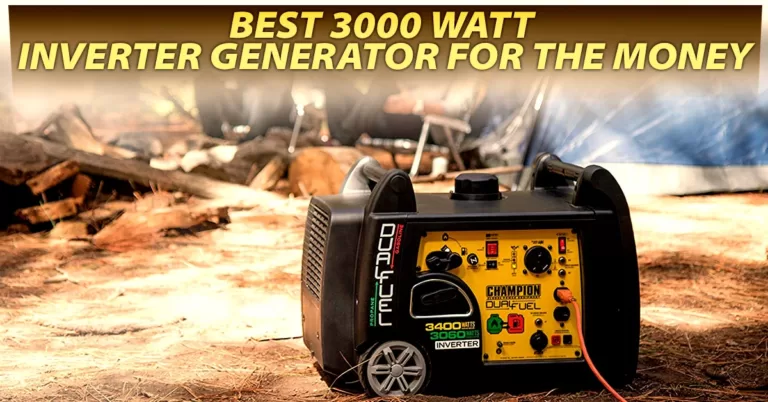Best 5500 Watt Portable Generator
In this world, darkness is a thing of the past when you have power in your hands. Imagine a stormy night with the rain pouring down and you and your neighborhood without electricity. But don’t worry because there’s a solution: portable generators, which fulfill our power needs. These generators are lightweight and efficient and can run on different fuel types.
And 5500-watt generator is perfect whether you have an RV, travel trailer, or at a camping place, home, or office. It’s known for being quiet and reliable. With 5500-watt portable generators, you will always be aware of the situation, so I reviewed different generators to help you choose the best 5500 watt portable generator. Now it’s time to get power and enjoy its convenience.
Champion Power Equipment 100231 5500-Watt Dual Fuel Portable Generator
Power up your adventures with the Champion Power Equipment 100231 5500-Watt Dual Fuel Portable Generator. With 5500 watts of reliable power, it’s perfect for Home, RV trips, camping, and backup power. Choose between gasoline and propane, and enjoy peace of mind with its powerful engine and versatile features.
Review Summary Tabel
| Specifications | Details |
|---|---|
| Power Output | 5500 watts (running), 6900 watts (starting) |
| Fuel Type | Gasoline, Propane |
| Fuel Tank Capacity | 6.1 gallons |
| Run Time | Up to 10 hours (gasoline), up to 6.5 hours (propane) |
| Engine | 389cc Champion OHV |
| Starting Method | Electric, Recoil |
| Noise Level | Quiet operation |
| Dual Fuel Capability | Yes |
| Cold Start Technology | Yes |
| Voltage Protection | Volt Guard surge protector |
| Monitoring | Intelligauge display |
| Safety Features | Low oil shut-off sensor, oil funnel included |
The generator is a powerful and reliable solution for all your power needs. With 5500 watts of power, Champion Power Equipment 100231 5500-Watt Dual Fuel Portable Generator is perfect for RV trips, camping, and backup power at home.
One of the standout features of this generator is its ability to run on gasoline and propane. You can choose the fuel that suits you best.
A large 6.1-gallon fuel tank can provide up to 10 hours of runtime on gasoline or 6.5 hours on propane. It even comes with a propane hose and built-in regulator for easy use.
The generator has a powerful 389cc Champion engine that gives you 6900 starting and 5500 running watts when using gasoline. If you use propane, it provides 6250 starting watts and 5000 running watts. Plus, it has Cold Start Technology, which starts quickly and reliably in any weather condition.
What is Cold Start Technology in Generator?
Generators with Cold Start Technology are designed to start easily, even in cold weather. They handle issues like thickened oil, ensuring the generator operates smoothly and reliably.
This generator runs quietly, allowing you to enjoy quiet in your surroundings. It’s also lightweight and compact, making it easy to carry around and store.
Safety is a priority, and this generator has you covered. It includes a built-in Volt Guard surge protector to prevent overloads and keep your equipment safe. The Intelligence feature keeps track of voltage, hertz, and runtime hours so that you can monitor power output and plan maintenance. Additionally, it has a low oil shutoff sensor and an oil funnel for easy and safe maintenance.
Setting up and moving this generator is easy and hassle-free. Champion has made sure that the packaging is user-friendly for a simple setup. The foldaway U-shaped handle and wheel kit with never-flat tires allow you to move the generator to any desired location effortlessly.
The Champion Power Equipment 100231 meets EPA certification and CARB compliance, ensuring it follows environmental regulations. It’s eco-friendly, producing no harmful emissions. You’ll have peace of mind with a 3-year limited warranty and access to nationwide service centers. Plus, you get FREE lifetime technical support from their experts.
The Champion Power Equipment 100231 5500-Watt Dual Fuel Portable Generator is easily found on Amazon. There, you’ll discover detailed specifications, customer reviews, and all the information you need to make a well-informed decision. Visit Amazon now!
DuroMax XP5500HX Dual Fuel Portable Generator
Experience the power and reliability of the Champion Power Equipment 100231 generator. With its impressive 5500-watt output, it’s perfect for camping, Home, Office, and emergencies. Enjoy peace of mind with CO Alert technology and the convenience of multiple outlets. Trust in Champion’s quality and get yours now.
Review Summary Tabel
| Specifications | Details |
| Wattage | 5500 watts |
| Fuel Type | Dual fuel (gas and propane) |
| Noise Level | Quiet operation |
| Weight | Lightweight |
| Portability | Portable |
| Best Use | RVs, camping, home use, job sites |
| Power Outlets | Multiple outlets (GFCI, USB) |
| Inverter Technology | Inverter |
| Fuel Efficiency | Fuel efficient |
| Brand | Reputable brand |
| Electric Start | Electric start |
| Rating | Highly rated |
| Runtime | Up to 19 hours (gasoline), up to 15 hours (propane) |
| Warranty | 5-year warranty |
I recently tried the Champion Power Equipment 100231 generator, and it’s the best 5500-watt portable choice. With its impressive 5500-watt power output, it exceeded all my expectations. Perfect for camping, RV trips, and demanding jobs.
Its CO Alert technology in this generator is a fantastic feature. It automatically shuts down if it detects high levels of carbon monoxide, ensuring the safety of my family. It brings me peace of mind, especially during emergencies or power outages.
The generator has impressive specs with 5500 peak watts and 4500 running watts. It also features multiple GFCI outlets and USB ports, allowing me to power various devices and appliances conveniently.
This generator packs a punch with its peak wattage of 5500 and running wattage of 4500. It’s equipped with multiple GFCI outlets and USB ports, powering various devices and appliances conveniently.
Impressive Specifications for Any Situation:
| Gasoline Specifications | Gasoline | Propane |
| Peak Wattage | 5,500 | 5,225 |
| Running Wattage | 4,500 | 4,275 |
| Runtime at 25% Load | 19 hours | 15 hours |
| Runtime at 50% Load | 9 hours | 8 hours |
| Engine & Emission Specifications |
| Engine Manufacturer: DuroMax Power Equipment |
| Engine Type: 4-Stroke |
| Starting Type: Rocker Switch |
| Fuel Delivery System: Carburetor |
| Recommended Oil: 10W-30 |
It is lightweight and portable, with a wheel and handle kit for easy transportation. It also offers a 5-year warranty for extra assurance. It runs smoothly and efficiently in terms of performance, providing up to 19 hours of power at 25% load with gasoline and up to 15 hours with propane.
The control center features a digital multimeter that displays voltage, frequency, hours run, and maintenance reminders. The generator is built with strong metal construction for long-lasting durability. It also includes helpful accessories such as an oil funnel, spark plug wrench, and toolset.
The customer service and technical support from DuroMax have been excellent. They have been responsive and helpful in addressing my questions or concerns.
Champion Power Equipment 100231 generator is a reliable solution for camping, RV trips, or power outages. With its quality, versatility, and safety features, it consistently performs well. For more information, visit Amazon.
GENMAX GM5500i 5500 Watt Inverter Generator
Review Summary Tabel
| Specifications | Details |
|---|---|
| Power | 5500 watts (starting) / 5000 watts (running) |
| Engine | 4-stroke 312cc OHV |
| Fuel Type | Gasoline |
| Fuel Tank Capacity | 3.6 Gallons |
| Runtime | 8.5 Hours Half Load Run Time |
| Dimensions | 24.0″x18.5″x21.1″ |
| Special Features | Inverter technology, CO Detect |
| Weight | 127.8 Pounds |
| Voltage | 240 Volts |
| Output Wattage | 5500 Watts |
| Provides clean and safe power for sensitive electronics | |
| Special Feature | Electric start, CO Detect |
| Compact size and built-in handle for easy transportation | |
| Manufacturer | GENMAX |
Looking for the best portable 5500-watt generator? The GENMAX GM5500i Gasoline Inverter Generator is the only option. It has far above my expectations and is excellent for traveling and camping. Excellent performance is guaranteed.
Its inverter technology is one of its most significant features. Less than 5% total harmonic distortion (THD) is produced by its 5500-watt inverter, which delivers clean power.
- A generator produces clean power without waveform distortion, making it safe for sensitive electronics such as laptops and smartphones without damaging them.
Even in remote areas, the GM5500i offers reliable, high-quality power production.
Another wonderful feature of the GM5500i is portability. It’s portable due to its lightweight and small size. Convenience is increased by the built-in handle, which enables you to take it easily wherever you need to.
Let’s now discuss noise. This generator is exceptional in that regard. Noise levels are significantly reduced by its quiet and completely enclosed design. You can enjoy the tranquility of nature without the disturbance of a loud generator in the background.
Safety is a top priority. It includes a CO Detect feature that automatically shuts off the generator when it detects unsafe levels of carbon monoxide. Gives you peace of mind, especially when using the generator in enclosed spaces like an RV.
- Carbon monoxide (CO) is dangerous because it is a colorless, odorless gas that can be fatally inhaled. Generators generate CO as a byproduct of combustion, which, if not properly ventilated, may build up carbon monoxide poisoning in enclosed areas like homes or RVs.
Visit Amazon to learn more about the GENMAX GM5500i and check user reviews. Learn more about this generator and get it now!
MaXpeedingrods 5500W Inverter Generator
Review Summary Tabel
| Specifications | Details |
|---|---|
| Power Output | Engine: 4-stroke 312cc OHV, air-cooled |
| Voltage | Voltage: AC 120V/240V |
| Frequency | Frequency: 60Hz |
| Outlets | – 2x 120V 20 Amp Outlets |
| – 1x 120V 30 Amp Outlet | |
| – 2x USB Outlets | |
| Ease of Start | Electric start with recoil start backup option |
| Noise Level | Quiet operation at 62 dB from 23 feet |
| Run Time | Up to 13 hours at 25% load and 10 hours at 50% load |
| (Full tank of gas: 13.5 liters) | |
| Fuel Efficiency | Eco mode for maximizing fuel efficiency and extending running time |
| Safety Features | LED alerts for low oil, overload, and output readiness |
When I tried the gas-powered 5500-watt MaXpeedingords portable generator, I found it amazing, and its performance was exceptionally good and reliable.
The generator has a powerful output of 5500 peaks and 5000 running watts. It can provide enough power for various needs like backup power at home, job sites, or woodworking projects.
One great feature of this generator is how easy it is to start. You have two options:
- Electric start
- Recoil start
It’s an electric start, which takes only a push button and is extremely simple. In contrast, recoil start is the backup option for starting the generator.
Noise from generators can be an issue, but this one operates quietly at 62 dB from 23 feet. It’s ideal for home emergencies, RV trips, camping, or anywhere you want to keep noise levels down.
The generator itself is effective in terms of runtime. It can run for at least 13 hours at 25% load (1250 watts) and roughly 10 hours at 50% load (2500 watts) with a full tank of petrol (13.5 liters).
- It also has an eco mode that helps maximize fuel efficiency and extends the running time even more.
Let’s talk about the specifications.
It has a 4-stroke 312cc OHV, air-cooled engine that delivers reliable performance. The generator supports an AC voltage of 120V/240V and operates at a frequency of 60Hz. It has multiple outlets, including 2x 120V 20 Amp Outlets, 1x 120V 30 Amp Outlet, 2x USB Outlets, and 1x 120/240V 30-Amp Outlet, giving you flexibility in powering different devices.
These specifications provide the necessary information about the engine, voltage support, frequency, and outlets of the generator, allowing you to understand its capabilities and compatibility with different devices.
Regarding safety, this generator has LED alerts for low oil, overload, and output readiness, so you’re always aware of potential issues. It also comes with a CO alarm to protect you from carbon monoxide.
It is simple and convenient to use this generator. It has a digital meter that makes it simple to monitor by showing the voltage output, fuel level, and running time. It is easily portable and handy to use anywhere needed because of its small size, wheels, and extendable handle.
MaXpeedingrods is a reputable brand known for producing high-quality and reliable generators. Their gas Powered 5500-Watt Portable Quiet Inverter Generator is powerful, reliable, and fuel-efficient, making it a top choice for various needs. Check it out on Amazon for more details.
SIMPSON Cleaning SPG5568 Portable Gas Generator
Review Summary Tabel
| Features | Details |
| 5500 running watts and 6875 starting watts | Provides ample power for various devices and appliances |
| Inverter technology | Ensures clean and stable power output |
| Dual-fuel capability | Gives the flexibility to use either gasoline or propane |
| 6.6-gallon gasoline fuel tank | Offers a long run time of 9.5 hours at 25% load |
| Quiet operation | Minimizes noise disturbances during use |
| Portability | Lightweight design with a foldable handle and never-flat wheels |
| GFCI protection and CO2 sensor | Enhances safety during operation |
| Multiple outlets with GFCI protection | Allows for convenient connection of various devices |
| Powerful CRX® 420 engine | Provides durability and protection with low oil shutdown |
| 50-state compliant | Meets the standards set by the Portable Generator Manufacturers’ Association (PGMA) |
I highly recommend the SIMPSON Cleaning SPG5568 Portable Gas Generator if you enjoy outdoor activities and traveling. It’s the best 5500-watt generator I’ve ever used, exceeding all expectations.
HAVING A RELIABLE POWER SOURCE IS IMPORTANT?
The SPG5568 portable gas generator is perfect for camping and RV trips. With its inverter technology and 5500 watts of power, it easily runs all my devices and appliances, including an electric grill, laptop charging, and a small refrigerator.
- One great feature of this generator is that it can use gasoline or propane. Selecting the right fuel for my requirements and available supplies was easy.
With its 6.6-gallon gasoline fuel tank, I could enjoy a long runtime of 9.5 hours at 25% load, so I didn’t have to refill it frequently.
I was truly impressed by how quietly the SPG5568 generator operated. Compared to other generators I’ve used, it made very little noise. This is because of its advanced design and special materials that help reduce sound.
Another great generator is highly portable with its foldable handle and never-flat wheels. It’s easy to carry and move around, even on different types of terrain.
Safety is always my top priority; It includes GFCI protection and a CO2 sensor, making me feel even more secure using it.
- GFCI protection is an important safety feature in generators. It quickly detects any electrical imbalances and shuts off the power to prevent shocks. This feature ensures your safety when using the generator.
- Generator safety is important, and that’s why CO2 sensors are used. These sensors measure carbon dioxide gas levels. If the levels become too high, the sensor will alarm or shut down the generator to protect you from harm.
The generator’s control panel has five outlets that are covered for protection. These outlets include one 120V 30A locking outlet and four 120V 20A household outlets. They all have GFCI protection, which helps prevent electrical accidents and keeps you safe.

A powerful CRX® 420 engine with low oil shutdown for durability. It meets the standards set by the Portable Generator Manufacturers’ Association (PGMA), ensuring reliability and performance.
If you need a powerful and versatile portable generator, the SIMPSON SPG5568 is your best choice. With its high wattage, dual-fuel capability, quiet operation, and portability, it’s perfect for outdoor adventures and backup power at home. Visit Amazon for more information and customer reviews of the SIMPSON SPG5568 Portable Gas Generator.
Yamaha 5500 Watt EF6300ISDE Inverter Generator
Buying Guide For 5500 Watt Portable Generator
When the power goes out, having a reliable portable generator is crucial. Take your time to research and consider important factors to find the perfect 5500-watt generator. This buying guide will help you make a smart choice, ensuring peace of mind during power outages.
It would help if you considered the following:
Power Requirement
Before selecting a 5500-watt portable generator, consider the power needs of your devices. Knowing their requirements ensures proper functionality. Create a list of items to connect, such as camping, traveling, or RV use, to determine the appropriate power capacity for your requirements.
Budget
Setting a budget is essential when choosing a portable generator, even if you desire a top brand. While reliability and quality are crucial, it’s important to consider your financial capacity. A defined budget will help you limit your choices and find the best generator for your price range.
Look for a balance between desired features and the price you’re willing to pay, such as:
- Fuel efficiency
- Lightweight design
- Portability
- And the price you’re willing to pay. You can save money this way and avoid ending up with a low-quality, cheap portable generator that doesn’t meet your needs.
Portability
Consider how portable you need your generator, especially for travel or camping. Look for lightweight models with wheels and foldable handles for easy transportation. Finding a highly-rated portable generator that offers power and portability will effectively meet your needs.
Extra Features
Consider additional features that are also important to select the best generator. These features include:
Inverter generators: Inverter generators give clean and steady power, perfect for sensitive devices like phones and laptops. They save fuel, run quietly, and are small. They change AC power to DC power and back, providing reliable and safe power while using less fuel and making less noise. Think about this when buying a generator.
Noise levels: Picking a quiet generator, especially with inverter technology, brings more advantages than reducing noise. It makes the surroundings peaceful, increases comfort, improves communication, and saves fuel. Inverter generators are especially good at keeping noise to a minimum compared to regular generators.
- Choose a generator with noise levels below 60 decibels to protect your hearing and maintain a quiet environment.
Automatic Voltage Regulation (AVR): Generators with Automatic Voltage Regulation (AVR) are essential for maintaining stable and reliable voltage levels. Protecting sensitive electronic equipment and ensuring it functions properly, even if voltage fluctuation occurs, is important. For added safety, it’s best to select a generator with AVR.
- For instance, an appliance needs 120 volts to work correctly. An AVR-equipped generator automatically adjusts its voltage output to ensure a steady and reliable supply of 120 volts, keeping the appliance running smoothly and safely.
Automatic Idle Control: Generators with Automatic Idle Control are smart enough to adjust their engine speed according to the power needed. It also helps to reduce noise. The engine will run at a lower speed when the power demand is low. This makes the generator quieter and more efficient.
Electric Fuel Injection (EFI): EFI (Electronic Fuel Injection) is a better choice than traditional generator carburetors. It enhances the engine’s performance, improves fuel efficiency, makes starting easier, ensures reliability, and delivers consistent power output. With EFI, you can enjoy a more efficient and reliable generator experience.
Dual Fuel Capability and Efficiency: Dual fuel generators can run on multiple fuel sources, such as propane, natural gas, or gasoline. This flexibility solves fuel availability concerns during emergencies, camping, or RV trips. With dual fuel capability, you can enjoy longer run times, save on fuel costs, and have greater versatility in your power options.
Fuel gauge: A fuel gauge allows you to monitor the fuel level of your generator easily. It helps you plan to refuel refueling and avoid sudden power interruptions, ensuring an uninterrupted power supply.
Electric start with recoil backup: When choosing a portable generator, look for ones with Electric Start and a Recoil Backup. Electric Start makes it easy to start the generator with a button, adding convenience. The recoil backup ensures reliable starting, even if the generator’s battery is low or dead.
Manual fuel shutoff valve: A Manual Fuel Shutoff Valve is important for safety and convenience. It allows you to turn off the fuel supply when the generator is not in use or during storage, preventing fuel leaks and reducing fire risks. It also helps save fuel and makes maintenance tasks like draining the tank or doing repairs easier.
Longer run time: Choosing a longer runner generator is helpful for extended power outages or remote locations. It reduces the need for frequent refueling, saving time and effort. Opting for a long-runner generator ensures continuous operation without worrying about fuel depletion.
Extended Run Time and Maintenance-Free Electric Battery: Prioritize generators with electric start and maintenance-free batteries. With a maintenance-free battery, you won’t have to check water levels or clean terminals regularly. This guarantees a dependable power supply without interruptions during emergencies or power outages.
Spark Arrestor and Engine Protection: When purchasing a portable generator, it’s important to consider models that come with a spark arrestor. This feature helps prevent sparks and flames from coming out of the exhaust, reducing the fire risk. It’s especially crucial in areas like national parks where there are regulations for generator use, ensuring both environmental safety and compliance with the rules.
OHV engine with automatic low oil shutoff: When searching for a generator, choosing one with an overhead valve (OHV) engine is beneficial. These engines are known for their effectiveness and durability. An automatic low oil shutoff system is also crucial as it safeguards the engine against damage when the oil level is low. This ensures a reliable and stress-free power supply, giving you peace of mind.
Multiple Covered Outlets: When considering a generator, consider the ones with different covered outlets. These outlets can fit various plugs and devices, giving you flexibility. They keep your connections strong, protect against dust and debris, and make your generator last longer. With covered outlets, you can easily power different appliances and equipment.
When buying a 5500-watt portable generator, gather information and consider power needs, budget, portability, and features. Make informed decisions for reliable power during emergencies. Research helps you find a dependable generator you can trust when the lights go out.
Will a 5500-watt generator run a well pump?
The answer depends on the specific power requirements of your well pump. Well pumps come in different sizes and power capacities, and it’s important to understand the running and starting watts your pump needs.
Running watts are the continuous power needed to keep the pump running while starting watts are the extra power needed to start the pump initially. Well, pumps usually have higher starting watts to overcome initial resistance and start the motor.
I have found rough estimates for different types of pumps:
I have found rough estimates for different types of pumps:
| Horse Power | Running Watts | Starting Watts |
| 1/3 | 750 | 1500 |
| 1/2 | 1000 | 2100 |
| 3/4 | 1500 | 3000 |
| 1 | 2000 | 4000 |
To know how much power your well pump needs, check the pump’s information plate or refer to the manufacturer’s specifications. Look for details like horsepower rating and voltage information to determine the power requirements accurately.
One way to estimate the power requirement in watts is by using the formula:
Total Power Requirement = Voltage (V) x Current (A) x Power Factor
The power factor is typically 0.8 for most well pumps. For example, let’s consider a 1-horsepower well pump with a voltage of 240V. Using Ohm’s law, we can calculate the current as:
Current (A) = Power (W) / Voltage (V)
Suppose the pump requires 8 amps of current. Plugging these values into the formula, we can calculate the total power requirement:
Total Power Requirement = 240V x 8A x 0.8 Total Power Requirement ≈ 1549.6W
Based on this calculation, a 5500-watt generator can run the well pump because the total power requirement is lower than the generator’s capacity.
It would help if you kept in mind that the starting watts of your pump might be higher than the running watts. Suppose the generator’s capacity is insufficient to handle the starting watts. In that case, it can cause difficulties in starting the pump or activating the generator’s overload protection.
It’s best to consult the manufacturer’s specifications for your well pump for reliable operation. Also, consider factors like motor efficiency, voltage fluctuations, and other devices running on the generator simultaneously.
In certain situations, you may need a generator with higher wattage or explore options like soft start devices or dedicated well pump generators to ensure smooth operation.
Will A 5500 Watt Generator Run A Central Air Conditioning System?
When running a central air conditioning system, it’s crucial to consider the specific details of your unit to determine if a 5500-watt generator can meet its power requirements.
To find out the power needs of your central AC unit, check the label or tag attached to the unit. This label contains important information about the electrical characteristics of the air conditioner. Pay close attention to the following specifications:
- LRA (Locked Rotor Amps): This number shows the maximum current the compressor draws when starting with full voltage.
- RLA (Rated Load Amps): The RLA value represents the highest current the compressor should draw under operating conditions.
- FLA (Full Load Amps): FLA means the same as RLA and indicates the maximum current the compressor should draw when running at full load.
These values, particularly LRA (Locked Rotor Amps) and RLA (Rated Load Amps), are essential in estimating the power needed to start and run your central AC unit. Take these specifications into account, along with factors such as cooling capacity (measured in BTU) or rated power consumption (in watts), to better understand your unit’s power requirements.
For example, let’s say your central air conditioner has these specifications:
- LRA: 60 Amps
- RLA: 20 Amps
- FLA: 18 Amps
Based on these values, you can estimate the power requirements:
- Starting Watts: LRA x Voltage (V) = 60A x 240V = 14,400W
- Running Watts: RLA x Voltage (V) = 20A x 240V = 4,800W
Remember that these values can vary based on your central air conditioner’s manufacturer, model, and cooling capacity. Check the label or consult the manufacturer’s specifications for your specific unit to determine the exact power requirements.
It’s advisable to seek assistance from a professional electrician or HVAC specialist to ensure safe and reliable operation. They can offer expert guidance, accurately assess your system’s power needs, and determine if a 5500-watt generator is sufficient for your unit.
While a 5500-watt generator may suffice for smaller or energy-efficient central AC units with lower power demands, it might struggle to start or trigger the generator’s overload protection if your AC unit requires more power.
In such situations, you can explore alternative solutions, such as opting for a higher-wattage generator, selecting a generator with a built-in soft start feature to manage the initial power surge, or considering a dedicated standby generator designed for central air conditioning systems.
Will A 5500 Watt Generator Run A Refrigerator?
When deciding if a 5500-watt generator can power your refrigerator properly, you must consider a few factors. As a homeowner, it’s important to understand your refrigerator’s running and starting watts.
Running watts
First, understand the running watts of your refrigerator, which is the continuous power it needs to keep running once it starts.
Starting watts
Second, consider the starting watts, which are the extra power required to start the compressor.
Refrigerators have different power needs, which can be influenced by several factors, including:
- Size
- Age
- Efficiency
Modern refrigerators are energy-efficient, using less power than older models. They usually require around 600-800 watts to run continuously and 1800-2500 watts to start up. A 5500-watt generator can handle the running watts of a refrigerator, but starting watts should also be considered.
If the starting watts of your refrigerator are between 1800-2500, a 5500-watt generator will work fine. However, if the starting watts exceed 2500, the generator may struggle to provide enough power during startup, leading to issues like failure to start or overload protection activation.
To ensure your generator and refrigerator work well together, it’s best to check the manufacturer’s specifications for your specific refrigerator model. Look for the power requirements on the label, tag, or product manual. This will help you determine if a 5500-watt generator is sufficient or if you need other options. If your refrigerator’s power needs exceed what a 5500-watt generator can provide, here are a few possible solutions to consider:
- You have a few options to ensure your generator can handle your refrigerator’s power needs. One option is to get a generator with a higher wattage capacity that can handle the refrigerator’s starting watts.
- Another option is to use a “soft start” or “compressor start” kit. These devices reduce the initial power surge during startup, making it easier for the generator to handle the refrigerator’s power requirements.
To make the best decision, carefully consider your refrigerator’s power requirements, consult the manufacturer’s specifications, and take the necessary steps to ensure a reliable power supply from your 5500-watt generator. If needed, explore alternative solutions to meet your refrigerator’s needs.
Will A 5500 Watt Generator Run An Air Compressor?
Air compressors require a specific amount of power to function correctly. They have running watts, the continuous power needed while the compressor is running, and starting watts, which is the additional power required to start the motor and overcome resistance.
The power requirements of air compressors can vary depending on the following:
- Size
- Type
- Motor
- Efficiency
- Duty Cycle
Larger air compressors with higher horsepower motors generally require more power. Efficient motors consume less power for the same output, and compressors with higher-duty cycles may need continuous power.
To determine if a 5500-watt generator can handle your air compressor, check the manufacturer’s specifications on the compressor’s label, tag, or product manual.
For example, a 2-horsepower air compressor may need around 2200 watts to run and approximately 6000 watts to start. These estimates can vary depending on the compressor’s brand and model.
If your air compressor’s power requirements fall within the capacity of a 5500-watt generator, it should provide sufficient power. However, suppose the requirements exceed the generator’s capacity. In that case, you may encounter issues like overload protection tripping, breaker trips, or difficulty starting the compressor.
If your air compressor needs significantly more power to start than to run, there are a few options. You can consider a generator with a higher wattage that can handle the compressor’s demands comfortably. Another option is using a “soft start” or “motor starter” device, which reduces the initial power surge during startup, making it easier for the generator to handle.
Remember that running an air compressor on a generator for an extended period can consume much fuel. It’s advisable to choose a generator with good fuel efficiency or ensure you have enough fuel if you anticipate prolonged use.
By carefully considering your air compressor’s power requirements, checking the manufacturer’s specifications, and taking appropriate measures, you can determine if a 5500-watt generator suits your air compressor or explore alternative solutions.
Which Oil Is The Best For A 5500 Generator?
Choosing the correct oil for your 5500-watt generator is crucial for optimal performance. Here are some key factors to consider when selecting the right oil:
- Engine Type: Determine if your generator has a 2-stroke or 4-stroke engine. For a 5500-watt gasoline generator with a 4-stroke engine, you typically need SAE 30 oil in hot climates or SAE 10W-30 in cold climates.
- Viscosity: Consider the oil’s viscosity, which indicates its thickness. Generators require specific viscosity grades like 10W-30 or 10W-40. The first number represents cold weather performance, while the second represents normal running conditions. Match the oil viscosity to the temperature range of your generator’s usage.
- API Classification: Look for oil with an API classification of SN, ensuring it meets the necessary standards for engine protection.
- Synthetic vs. Conventional: Synthetic oils perform better in extreme temperatures and offer improved lubrication. Conventional oils are suitable for regular use and are more cost-effective. Consider your generator’s usage to determine which type suits your needs.
- Additives: Some oils contain additional additives that safeguard against rust and corrosion, enhancing your generator’s longevity. Look for oils with detergents, anti-wear agents, and antioxidants.
Consult your generator’s manual or contact the manufacturer to obtain the recommended oil for your specific model. They can provide the most accurate guidance based on your generator’s requirements.
Remember to regularly check and change the oil level to maintain your generator’s optimal performance.
By following these guidelines and using the proper oil, you can keep your 5500-watt generator in excellent condition, ensuring reliable power whenever needed.
How Many Amps Does A 5500 Generator Provide?
A 5500-watt generator delivers a specific amount of power, known as amperage, based on its voltage. Generators typically operate at either 120 volts or 240 volts. To determine the amperage provided by a 5500-watt generator, you can use a simple formula:
Amps = Watts / Volts.
For example,
If you have a 5500-watt generator operating at 240 volts, the amperage would be Amps = 5500 watts / 240 volts = approximately 22.92 amps.
Here is our handy cheat sheet:
| Wattage | 120 V Amperage | 240 V Amperage |
| 500 | 4.2 A | 2.1 A |
| 1000 | 8.3 A | 4.2 A |
| 2000 | 16.7 A | 8.3 A |
| 3000 | 25.0 A | 12.5 A |
| 4000 | 33.3 A | 16.7 A |
| 5000 | 41.7 A | 20.8 A |
| 6000 | 50.0 A | 25.0 A |
| 7000 | 58.3 A | 29.2 A |
| 8000 | 66.7 A | 33.3 A |
| 9000 | 75.0 A | 37.5 A |
| 10000 | 83.3 A | 41.7 A |
| 12000 | 100.0 A | 50.0 A |
| 14000 | 116.7 A | 58.3 A |
| 16000 | 133.3 A | 66.7 A |
Remember that these calculations are estimates and may vary slightly depending on the generator’s features. Some generators have multiple outlets with different amp ratings, so it’s important to check the specifications for each outlet’s exact amp output.
When connecting devices or appliances to a generator, consider their amp requirements. Ensure all connected devices’ total amp load doesn’t exceed the generator’s amp capacity. Overloading the generator can lead to problems like tripped breakers or damage to the generator and devices.
Suppose you have questions about amp requirements or specific power needs. In that case, contacting the generator’s manufacturer is best or referring to the product documentation for accurate information on amp output and proper usage is best.
How Long Will A 5500-Watt Generator Run?
On average, a 5500-watt generator can run for approximately 11 hours when operating at half of its maximum capacity. However, it’s important to note that this is just an average and may vary among different generators.
The actual runtime of a generator depends on various factors, including the power load it’s handling, fuel efficiency, and the operating conditions.
To estimate the runtime of a 5500-watt generator, consider its fuel capacity and consumption rate. The manufacturer typically provides the fuel consumption rate in the product specifications or owner’s manual. Divide the fuel capacity by the fuel consumption rate to estimate the runtime.
Remember that this is a general estimation, and the actual runtime may differ based on specific circumstances.
The formula to estimate the runtime is:
Runtime = Fuel capacity / Fuel consumption rate
For example, suppose a 5500-watt generator has a fuel capacity of 5 gallons and a fuel consumption rate of 0.5 gallons per hour. In that case, you can estimate the runtime like this:
Runtime = 5 gallons / 0.5 gallons per hour Runtime = 10 hours
Remember that the estimated runtime provided earlier may be different in real-world situations. Various factors can influence the actual runtime, such as increased power demand, less efficient operation, or changes in fuel consumption.
Another important consideration is the load placed on the generator. Running it at maximum capacity for an extended period can use more fuel and reduce the runtime. It’s crucial to ensure that the combined wattage of the devices connected to the generator remains within its capacity.
The type of fuel used also affects the runtime. Gasoline-powered generators typically have shorter runtimes than diesel-powered ones, as diesel fuel tends to be more efficient.
To maximize your generator’s runtime, consider using energy-efficient appliances, avoid wasting power, and stay on top of maintenance tasks like regular oil changes and cleaning the air filter. These practices can help prolong the generator’s operation.
Here’s a table summarizing the examples you provided:
Here’s a table summarizing the examples you provided:
| Generator Model | Running Watts | Runtime on Load | Fuel Capacity (gal) |
| Yamaha EF6300ISDE | 5,500 | 13.3 hr | 4.5 |
| Generac GP5500 | 5,500 | 10 hr | 7.2 |
| Pulsar PG6580E | 5,500 | 12 hr | 5.2 |
| Westinghouse WGen5500 | 5,500 | 15 hr | 6.6 |
| PowerShot SPG5568 | 5,500 | 9 hr | 6.1 |
| Briggs & Stratton S5750 | 5,750 | 11.5 hr | 7.5 |
| Honda EU7000iS | 5,500 | 16 hr | 5.1 |
| Ryobi RY905500 | 5,500 | 9 hr | 6.0 |
| Powermate CX5500 | 5,500 | 12.5 hr | 7.0 |
Which Transfer Switch Is The Best For A 5500 Generator?
Selecting the right transfer switch for your 5500-watt generator requires considering various factors and your specific requirements. There is no universal solution that suits everyone. When choosing a transfer switch, please consider its features, the power capacity you require, and your budget.
What Is The Best 5500 Generator Under $700.00?
After carefully reviewing numerous generators that provide around 5500 running watts, I have selected four affordable options that fit within a budget. Check these generators below:
- WEN 56475 4750-Watt Portable Generator with Electric Start
- DuroMax XP5500EH Electric Start-Camping & RV Ready
- WEN DF475T Dual Fuel 120V/240V Portable Generator with Electric Start
Which 5500 Generator Is The Best For An RV?
Consider a few important factors when you are looking for a 5500-watt generator for your RV. Consider the generator’s power output, noise level, and compatibility with your RV. While there aren’t generators specifically designed for RVs in the 5500-watt range, suitable options can work effectively with RVs.
Which 5500 Generator Is The Quietest?
Finding reliable information about the quietest 5500-watt generator can be challenging. However, my research shows that a few generators are known for operating relatively quietly. Here are our recommendations:
- Honda EU7000iS: Customers have given positive feedback about this generator’s quiet performance.
- Yamaha EF6300iSDE: Another generator that is recognized for its quiet operation.
- Honda EM6500S: This model has also received praise for its low noise levels.
What Is The Best 5500 Generator With An Electronic Start?
Suppose you’re looking for a 5500-watt generator with the convenience of an electronic start. In that case, there are a few options that are highly regarded:
- Honda EU7000iS: This generator offers an electronic start and boasts excellent overall quality and reliability. It has received positive reviews for its performance and ease of use.
- Yamaha EF6300iSDE: Known for its reliable and quiet operation, this generator features an electronic start and is considered a top choice for those seeking convenience.
What Is The Best Diesel 5500 Watt Generator?
Suppose you’re looking for a 5500-watt generator with the convenience of an electronic start. In that case, there are a few options that are highly regarded:
- Honda EU7000iS: This generator offers an electronic start and boasts excellent overall quality and reliability. It has received positive reviews for its performance and ease of use.
- Yamaha EF6300iSDE: Known for its reliable and quiet operation, this generator features an electronic start and is considered a top choice for those seeking convenience.
What Is The Best Propane 5500 Watt Generator?
When it comes to finding the best propane-powered 5500-watt generator available on Amazon, there are a few options to consider:
Which 5500 Watt Generator Is The Best For A Construction Site?
The best 5500-watt generator for a construction site should have these features:
- Enough power to start heavy tools and equipment.
- Covered outlets to protect from dirt and moisture.
- Stable and clean power output for sensitive electronics.
- Quiet operation to avoid disturbing workers.
- Portable with handles and wheels.
- Strong and durable design.
One recommended option is the Westinghouse WGen5500. It has all these features and is also affordable. But remember, choose a generator that fits your specific needs and budget.
What Is The Best 5500 Watt Generator With A Plastic Gas Tank?
In the 5500-watt generator category, the Yamaha EF6300ISDE is considered one of the best options with a plastic gas tank. It has received positive reviews and is known for its durability. The plastic gas tank provides convenience while maintaining a good power output and reliability balance. Remember always to follow maintenance and safety guidelines when using any generator with a fuel tank, regardless of the material.
Will A 5500 Watt Generator Run A Sump Pump?
A 5500-watt generator should be able to handle a typical residential sump pump. To determine if it can provide enough power, you can use the formula:
Watts (W) = Volts (V) x Amps (A)
Check the voltage (V) and amperage (A) information on the label or specifications of your sump pump. Multiply the voltage by the amperage to calculate the required wattage. It will help you determine if the 5500-watt generator can meet the power needs of your specific sump pump. Remember to consider the starting surge of the pump motor, as it may require additional power.
What Can You Power With This Generator?
| Device | Power Requirement (Watts) |
| Small window AC unit | 1,200 |
| Fridge with a freezer | 700 |
| Small well pump (1/2 HP) | 1,000 |
| Washing machine | 1,150 |
| Coffee maker | 1,000 |
| Microwave oven | 1,000 |
| Dishwasher | 1,500 |
| Pressure cooker | 700 |
| Espresso machine | 1,300 |
| Toaster | 850 |
| Ceiling fan | 60 |
| Vacuum cleaner | 200 |
| TV | 85 |
| Sump pump (1/2 HP) | 1,050 |
| Small heating system | 500 |
| Laptop | 50 |
| VCR / DVD Player | 100 |
| Smaller electric appliances | 400 |
| Power tools | 800 |
| Medium radiant heater | 1,800 |
| Window AC (10,000 BTU) | 1,200 |
| Electric water heater | 4,000 |
| Bench grinder | 1,400 |
| Radial arm saw | 2,000 |
| Hammer drill | 1,000 |
What You Need to Know About Portable Generators
When purchasing a portable generator, it’s crucial to consider how and where you intend to use it. You’ll often find regulations and restrictions on their usage in residential areas, homeowners associations, campgrounds, and construction sites. Selecting the right generator is essential to power the appliances or equipment you need while avoiding potential risks such as damage, fire, electrocution, or carbon monoxide poisoning.
How Generators Work
Portable generators consist of two main components: an engine and an alternator. The engine drives the alternator, which produces AC (alternating current) power. Depending on the requirements, this power is then regulated to deliver either 120 or 240 volts. Since AC power is used in our homes, a generator can plug most devices into standard outlets.
Types of Generators
Standard Generators:
Also known as backup generators provide temporary power solutions. While smaller models are easily portable, larger ones have wheels and handles for improved mobility. They allow you to power appliances, tools, and devices by directly plugging them into the generator’s outlets. Some models even offer twist-lock plugs that can provide 240 volts for powering home circuits through a manual transfer switch.
Inverter Generators:
Inverter generators operate differently from standard generators. They generate 120/240 volts of AC power but convert it to DC (Direct Current) and then invert it back to AC. This conversion is facilitated by circuitry that filters and cleans up the electrical current, resulting in cleaner power with minimal distortion. Inverter generators are ideal for powering sensitive electronics prone to damage from current fluctuations or surges. However, remember that they usually come at a higher price point due to the advanced technology.
Note: Standby generators, permanently installed and connected to a home, fall outside the portable generator category as they primarily serve as power sources during outages or for entire homes.
By understanding the various types of generators and their functionalities, you can make an informed decision when selecting a portable generator that best fits your needs, ensuring a reliable power supply for your desired applications.
Generator Safety Tips & Precautions
To stay safe while using a generator, remember these important steps:
- Only connect the generator to your home’s electrical system if a qualified electrician has installed a transfer switch.
- Use the cords provided by the generator’s manufacturer or grounded extension cords to connect appliances. Check for any damage or wear on the cords.
- Use ground fault circuit interrupters (GFCIs) in wet or damp areas to quickly shut off power if there’s an electrical issue.
- Never run a generator indoors or in enclosed spaces like garages or basements. Even with open windows or doors, carbon monoxide (CO) can be harmful.
- If someone experiences dizziness, headaches, nausea, or tiredness while the generator runs, get them to fresh air immediately and seek medical help.
- Protect fuel containers from potential fire or heat sources such as generators, water heaters, cigarettes, lighters, and matches.
By following these safety tips, you can use your generator safely, minimizing the risk of accidents or harm to yourself and others.
FAQs
-
What can a 5500-watt generator power?
The runtime of a 5500-watt generator depends on factors such as the fuel tank capacity and the load it is powering. On average, a generator can run for approximately 8 to 12 hours with a full fuel tank at a 50% load.
-
How long can a 5500-watt generator run on a full fuel tank?
The runtime of a 5500-watt generator depends on factors such as the fuel tank capacity and the load it is powering. On average, a generator can run for approximately 8 to 12 hours with a full fuel tank at a 50% load.
-
Can a 5500-watt generator be used for sensitive electronics?
Yes, a 5500-watt generator can power sensitive electronics if it has a built-in inverter or produces clean power with low total harmonic distortion (THD). Look for “inverter generators” or “clean power” generators.
-
Can a 5500-watt generator be used for construction sites?
Yes, a 5500-watt generator can be suitable for construction sites, especially for powering smaller tools, lighting, and charging equipment. However, larger construction equipment may require a higher-wattage generator.
-
Is it easy to start a 5500-watt generator?
Most 5500-watt generators have either a recoil start (pull-start) or an electric start (push-button). Electric start generators are generally easier to start, requiring the press of a button. Recoil start generators require manually pulling a starter cord.
-
Can a 5500-watt generator be used in emergencies?
Yes, a 5500-watt generator can be used as an emergency backup power source for essential appliances during power outages. However, it’s important to properly connect and prioritize the electrical load to avoid overloading the generator.
-
What are the noise levels of a 5500-watt generator?
The noise levels of generators can vary, but most modern models come with noise reduction features. A 5500-watt generator typically produces noise levels ranging from 60 to 80 decibels (dB), similar to a normal conversation or background noise.
Conclusion
When looking for the best 5500 watt portable generator, remember to think about power, reliability, fuel efficiency, noise, and how well it fits your needs. After researching and listening to users, we found some top choices. These generators perform well, last long, and are easy to use. The right one for you will depend on what you want and need. By considering these things carefully, you can find the best 5500-watt portable generator that gives you the power you need for different uses.







